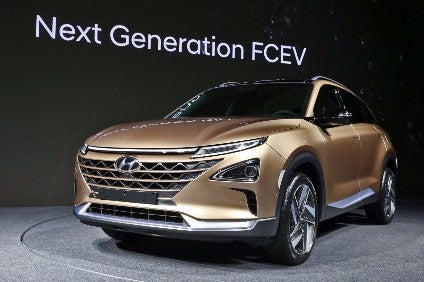
Hyundai Motor has offered an early glimpse of its next generation fuel cell vehicle, well ahead of the hydrogen-powered SUVs official launch early next year.
At a special preview event held in Seoul, the near production ready version exhibited its impressive capabilities while revealing its futuristic design. The yet to be named model embodies Hyundai Motor's commitment to a new era for advanced eco friendly vehicle development.

Discover B2B Marketing That Performs
Combine business intelligence and editorial excellence to reach engaged professionals across 36 leading media platforms.
Fourth generation fuel cell system
The new SUV shown at the special event previews Hyundai Motor's second commercially produced hydrogen model and uses the company's fourth generation of hydrogen fuel cell technology. The vehicle, its capabilities and fuel cell technologies are an evolution of global research, development and real world evaluation programmes.
The new fuel cell model was developed on four key pillars that focus on fuel cell system efficiency, performance (maximum output), durability, and tank storage density.
Fuel cell system efficiency: By enhancing fuel cell performance, reducing hydrogen consumption, and optimising key components, the vehicle's efficiency is greatly improved compared to its predecessor, the ix35 Fuel Cell. The new SUV boasts an efficiency level of 60%, or a 9% increase from the ix35's 55.3%. With enhanced system efficiency, the new model targets a driving range of 800km (500 miles) on a single charge (based on New European Driving Cycle standards).
Performance (maximum output): The new model's maximum output is enhanced by 20% compared to its predecessor, boasting an impressive 163PS of power. The fuel cell SUV also improves the car's cold start capability, overcoming the challenges of starting fuel cell vehicles in temperatures below freezing point. The vehicle's architecture is optimised to allow it to be started at -30 degrees C (22 degrees F), by incorporating key components in the fuel stack developed by Hyundai Motor. In addition to boosting the new car's capabilities, the enhanced components – such as MEA (membrane electrode assembly) and bipolar plates – also helped to reduce production costs.
Durability: By employing highly durable catalyst technology, the new hydrogen-powered SUV ensures even greater longevity than its predecessor.
Hydrogen storage: The next generation hydrogen vehicle makes significant improvements in tank storage density. The tank package now features three equally sized tanks, as opposed to two of different sizes. World-class tank gravimetric capacity (hydrogen storage mass per tank weight) was achieved through innovations to the plastic liner configuration and efficient layering pattern, which resulted in a reduction of thickness.
The mass-produced new vehicle will also feature advanced driver assistance technologies, alongside its extensive hydrogen powered range. The details of the new ADAS features will be disclosed in January at the 2018 CES, along with the official model name.
Hyundai Motor plans to take a multi-pronged approach to its eco-vehicle program. The company is committed to a future vehicle line-up comprising a variety of powertrain options – electric, hybrid and fuel cell – to suit customers' varied lifestyles.
Another part of the plan is the development of 4WD and FR (Front Engine Rear Wheel Drive) variants, building on its proprietary Transmission-Mounted Electrical Device (TMED) system, which was developed in 2011.
Hyundai Motor's electric vehicle development will take place in multiple phases:
Launch of EV version of the Kona compact SUV, with range of 390km in first half of 2018. Launch of Genesis EV model in 2021. Launch of long-range EV, with 500km range after 2021.
Hyundai Motor also will develop its first dedicated architecture for pure electric vehicles which will allow the company to produce multiple models with longer driving ranges.
Hyundai Motor will launch the new hydrogen SUV early next year in Korea, followed by North America and Europe. The company will also consider expanding availability of its new fuel cell model to markets with high growth potential for eco-friendly vehicles such as China.






